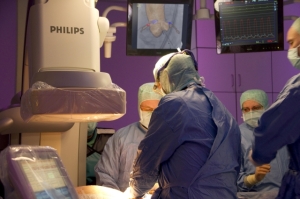by
Brendon Nafziger, DOTmed News Associate Editor | December 21, 2011
Royal Philips Electronics has released technology that merges CT scan images with real-time interventional X-ray footage to help doctors perform transcatheter heart valve replacements.
Instead of open heart surgery, these procedures let doctors replace or repair defective valves by making a small incision in the chest or groin and threading up a device through the blood vessels using a catheter. These procedures are generally performed in hybrid operating rooms.
The technology, called HeartNavigator, melds pre-op CT images with real-time interventional ones so doctors can get anatomical details of the heart along with the position of the catheter and the placement of the valves, Philips said.



Ad Statistics
Times Displayed: 0
Times Visited: 0 Keep biomedical devices ready to go, so care teams can be ready to care for patients. GE HealthCare’s ReadySee™ helps overcome frustrations due to lack of network and device visibility, manual troubleshooting, and downtime.
Medical City Dallas Hospital in Dallas, Texas is the first U.S. hospital to put the tool into clinical practice, the Dutch electronics giant said. The product has already been out in Europe since the first quarter of the year, Philips said, but it only recently got Food and Drug Administration 510(k) clearance.
Transcatheter valve procedure have head a head start in Europe, and about 13,000 transcatheter valve replacements were performed there last year, Philips said. While the valves have been commercially available in Europe for about three years, they have only recently reached U.S. markets. Edwards Lifesciences' SAPIEN transcatheter aortic heart valve, for instance, was approved by the FDA in early November.

